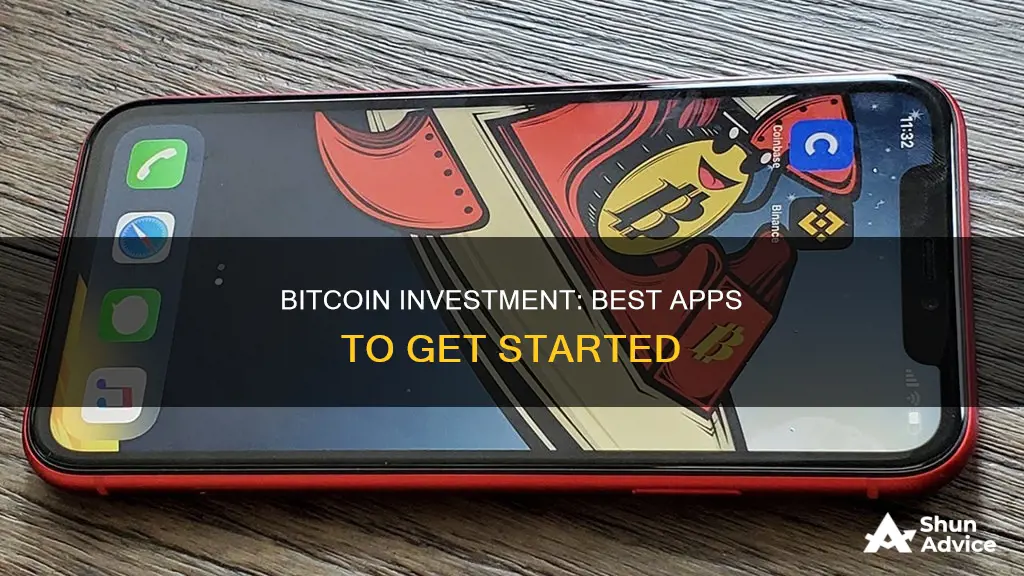
With the price of Bitcoin reaching new all-time highs, it's no surprise that many people are looking to invest in cryptocurrencies. However, it's important to approach this market with caution, as it can be extremely volatile. When choosing an app for investing in Bitcoin, it's important to consider factors such as security, fees, the range of cryptocurrencies offered, and the platform's reputation. Here are some of the best apps for investing in Bitcoin:
- Coinbase: Coinbase is widely considered one of the best cryptocurrency apps, especially for beginners. It offers a user-friendly interface, a wide selection of coins, and educational content. Coinbase also rewards users with free crypto for completing educational modules. However, it has higher fees compared to some other platforms and lacks advanced trading features.
- Kraken: Kraken is known for its strong emphasis on security and is a good choice for investors who prioritise the safety of their digital assets. It offers advanced features for experienced investors, low fees on its Pro platform, and a selection of over 180 cryptocurrencies.
- eToro: eToro is a platform that offers access to crypto and stocks. It stands out for its social trading feature, which allows users to copy the trades of successful investors. eToro offers over 100 cryptocurrencies and a user-friendly interface, making it appealing to beginners. However, its trading fees are relatively high at 1% of the transaction value.
- Cash App: Cash App is a popular financial services app that offers an easy way to buy, sell, and transfer Bitcoin. It's user-friendly, offers a range of features such as peer-to-peer money transfers and direct deposits, and charges fees ranging from 0 to 3% for Bitcoin transactions.
- Gemini: Gemini is a secure and compliant crypto exchange founded by the Winklevoss twins. It offers a user-friendly interface, a selection of over 70 cryptocurrencies, and FDIC insurance on USD deposits. However, its trading fees are relatively high, with a flat fee of 1.49% for orders over $200.
- Crypto.com: Crypto.com offers a comprehensive platform with a wallet, exchange, and crypto credit card. It has a wide range of services, including staking rewards and a large selection of over 350 cryptocurrencies. However, its app interface has been criticised for being cluttered, and its customer support is slow.
| Characteristics | Values |
|---|---|
| Best for beginners | Coinbase, eToro, Cash App, Crypto.com, Robinhood |
| Best for advanced traders | Kraken, Gemini, Crypto.com, Binance, eToro |
| Best for low fees | Kraken, Binance, Crypto.com, Robinhood |
| Best for security | Gemini, Kraken, Coinbase |
| Best for altcoins | BitMart, Crypto.com, Binance |
| Best for Bitcoin | Cash App, Coinbase, Gemini, Crypto.com |
| Best for social trading | eToro |
| Best for mobile app | Crypto.com |
What You'll Learn

How to choose the best crypto trading app
When choosing the best crypto trading app, there are several factors to consider. Here are some tips on how to choose the best crypto trading app for your needs:
- Supported assets: If you are looking to buy cryptocurrencies beyond Bitcoin, check the list of supported assets before deciding on an exchange. Some apps only support a few cryptocurrencies, while others allow you to trade hundreds. For example, Binance offers over 600 crypto tokens, while Kraken supports 180+ coins.
- Payment methods: Crypto exchanges typically offer various ways to fund your account or purchase crypto directly. While most platforms support wire transfers, some also allow you to buy crypto using credit cards, debit cards, and other digital payment methods. For instance, Coinbase accepts card and bank transfers, as well as payments through Apple Pay and Google Pay.
- Fees: High fees can eat into your investment returns, so it's important to research crypto exchange fees before signing up. Crypto exchanges typically charge trading fees and withdrawal fees, but other transaction fees may also apply. For example, eToro charges a flat 1% fee for crypto purchases, while fees on the free Kraken Pro platform range from 0-0.26%.
- Security: Crypto exchanges are a prime target for hackers, so it's crucial to choose an exchange with strong security measures in place. Look for features like two-factor authentication, cold storage, and insurance against potential breaches. Gemini, for instance, is known for its strong security measures, including hot wallet insurance.
- Customer service: If you're new to crypto or investing, you may need help getting started. In that case, consider choosing an exchange with excellent customer support.
- Reputation: Research the exchange's reputation before signing up. Read customer reviews, look into the exchange's history, and stay informed about any recent news or developments that might impact your decision.
Bitcoin Mining: Worth the Investment?
You may want to see also

Crypto platform security
Security is a key consideration when choosing a crypto platform to invest in Bitcoin. Here are some factors to keep in mind:
- Robust Security Measures: Look for platforms that offer a range of security features such as two-factor authentication, cold storage, insurance against potential breaches, and compliance with security standards and regulations. For example, Gemini, the best crypto exchange for security according to Investopedia, is SOC 2-certified and insures user funds in hot wallets.
- User-Friendly Interface: A simple and intuitive interface can help make the platform more secure by making it easier for users to navigate and understand the platform's security features. Gemini and Coinbase are known for their user-friendly interfaces.
- Regulatory Compliance: Choose a platform that complies with local regulations and security standards. For example, Gemini is regulated by the New York Department of Financial Services, while Coinbase is known for its strong regulatory compliance.
- Advanced Security Features: Some platforms offer more advanced security features such as Crypto.com's use of Passkeys, HSMs, FIDO2, and MFA methods like passwords, biometrics, and authenticator codes.
- Data Privacy: Ensure that the platform has measures in place to safeguard your personal information. For example, Crypto.com conducts data privacy assessments as part of its processes.
- Secure Wallet Technology: If the platform offers a crypto wallet, ensure that it uses secure technology. For example, Coinbase Wallet supports multiple blockchains and has a user-friendly interface.
- Reputation and Track Record: Consider the platform's reputation and track record when it comes to security. Check for any history of hacks or breaches, and look for platforms that have been independently assessed for security, such as Crypto.com, which has been assessed by globally recognised security consulting firms.
- Customer Support: Choose a platform that offers prompt and responsive customer support to help you with any security issues or concerns. 24/7 live customer support is ideal, as offered by Crypto.com.
Strategizing Bitcoin Investments: How Often to Invest?
You may want to see also

Different types of cryptocurrency available
There are thousands of cryptocurrencies available today, each with its own unique traits. They can be broadly categorized into two types: coins and tokens. Coins have their own independent blockchain, while tokens are non-native assets that run on top of existing blockchains. Here are some of the most popular types of cryptocurrency:
- Bitcoin (BTC): The first and most well-known cryptocurrency, Bitcoin runs on its own blockchain and has a fixed supply cap of 21 million coins.
- Bitcoin Cash (BCH): A cryptocurrency created from a hard fork of Bitcoin, aiming to address scalability issues and improve transaction efficiency.
- Ether (ETH): The cryptocurrency that runs on the Ethereum blockchain, Ether is uncapped, meaning an infinite number of coins can be created. Ethereum also supports smart contracts.
- Binance Coin (BNB): Native to the Binance cryptocurrency exchange, Binance Coin offers reduced transaction fees for users who choose to pay with BNB.
- Tether (USDT): A stablecoin designed to have less volatile pricing by being linked to the US dollar. However, there are debates about whether it is fully backed by dollar reserves.
- Solana (SOL): The native coin of the Solana platform, which can perform 50,000 transactions per second, making it attractive for investors seeking quick trades.
- XRP (Ripple): Often described as a "cryptocurrency for banks," XRP facilitates international payments and acts as a bridge between different currencies.
- Cardano (ADA): A "third-generation" cryptocurrency that splits its blockchain into two layers for increased transaction speed and improved experience for ADA holders.
- USD Coin (USDC): Another stablecoin similar to Tether, pegged to the US dollar, with more transparent funding and better auditing processes.
- Aave (AAVE): A decentralized crypto platform that uses smart contracts to enable users to borrow and lend cryptocurrencies, specializing in overcollateralized loans.
- Avalanche (AVAX): The native coin of the Avalanche platform, which competes with Ethereum as a popular blockchain for smart contracts.
These are just a few examples of the many different types of cryptocurrency available. Each has its own unique features, underlying technologies, and use cases in the digital currency landscape.
Teen's Guide to Bitcoin: Getting Started with Crypto
You may want to see also

Crypto staking fees and crypto coin interest
When it comes to investing in Bitcoin, there are a variety of apps available that offer different features and cater to different needs. Here are some of the best apps for investing in Bitcoin, along with an explanation of crypto staking fees and crypto coin interest:
Staking is a way of earning rewards by holding onto certain cryptocurrencies. Cryptocurrencies that use a "proof-of-stake" validation system allow investors to help validate transactions on the blockchain. In this process, investors must stake a minimum number of coins to become validators of transactions. By doing so, they contribute to the security and efficiency of the blockchain and are rewarded with cryptocurrency. The amount of staking rewards varies depending on the staking platform, the cryptocurrency, and the number of people staking a particular coin.
Staking often requires a lock-up period, where your crypto cannot be transferred for a certain period. This can be a drawback as you won't be able to trade staked tokens during this time. It's important to research the specific staking requirements and rules for each project before participating.
Some popular cryptocurrencies that use staking include Ethereum, Tezos, Cosmos, Solana, and Cardano.
Best Apps for Investing in Bitcoin:
- EToro: eToro offers a wide range of investment options, including cryptocurrencies, stocks, currencies, ETFs, and commodities. It charges a flat 1% fee for crypto purchases and has a user-friendly interface, making it a good choice for beginners.
- OKX: OKX is a large and trusted cryptocurrency exchange that offers both centralized and decentralized trading. It has low fees and supports over 350 cryptocurrencies. The decentralized exchange doesn't require Know Your Customer (KYC) verification, making it attractive for privacy-minded investors.
- Binance: Binance is the largest and most popular cryptocurrency exchange globally, handling over $10 billion in trading volume daily. It offers more than 600 cryptocurrencies and very low trading fees. The platform also includes features like margin and futures trading, an NFT marketplace, and copy trading.
- Coinbase: Coinbase is a well-known and regulated cryptocurrency exchange, offering an easy-to-use platform with strong security measures. It provides access to over 200 cryptocurrencies and has beginner-friendly features like Coinbase Learn, where users can earn crypto by completing educational modules. However, Coinbase has higher fees compared to some other platforms.
- Crypto.com: Crypto.com is a popular platform that offers a wide range of services, including an exchange, wallet, and crypto credit card. It supports more than 350 cryptocurrencies and provides competitive fees, especially when using its native token, CRO. The app also has an integrated NFT marketplace.
- Kraken: Kraken is a secure and trusted exchange with a focus on security and compliance. It offers low fees, advanced features for experienced traders, and a selection of over 180 cryptocurrencies. Kraken also provides 24/7 customer support and educational resources for beginners.
- Gemini: Founded by the Winklevoss twins, Gemini is known for its strong security measures and regulatory compliance. It offers a user-friendly interface, FDIC insurance on USD deposits, and insurance on its hot wallet. However, Gemini has higher trading fees and a more limited selection of cryptocurrencies compared to some other platforms.
- Cash App: Cash App is a popular financial services app that allows users to buy, sell, and transfer Bitcoin easily. It offers a user-friendly interface and supports peer-to-peer money transfers, direct deposits, and a debit card. However, Cash App only supports Bitcoin, limiting users who want to explore other cryptocurrencies.
When choosing an app for investing in Bitcoin, consider factors such as security, fees, the selection of cryptocurrencies, user experience, and regulatory compliance. Each app has its own strengths and weaknesses, so be sure to research and choose the one that best aligns with your investment needs and goals.
The Rise of Bitcoin ETFs: Why You Should Invest
You may want to see also

Crypto app transaction options
- Fees: Crypto apps typically charge various fees for transactions, including trading fees, deposit fees, and withdrawal fees. These fees can vary significantly between apps, so it's important to review and compare them before making a decision. For example, trading fees usually range from 0.1% to 0.5% per trade, but some platforms may charge higher fees for certain payment methods, such as credit or debit cards.
- Payment methods: Different crypto apps support different payment methods for depositing funds. While most apps accept bank transfers, some also allow the use of credit or debit cards, third-party e-wallets, or payment services like Apple Pay or Google Pay. It's important to ensure that the app you choose supports your preferred payment method.
- Transaction types: Before opening an account, make sure the crypto app offers all the transaction types you may need, such as depositing, withdrawing, and trading. It's also essential to understand the associated costs for each transaction type.
- Customer support: Look for an app that provides robust customer support, especially if you're new to crypto investing. 24/7 customer service transaction support can be invaluable when you need assistance with your account or transactions.
- User-friendliness: Choose an app with a user-friendly interface, especially if you're a beginner. Some apps offer multiple versions, such as a basic or lite version for newcomers and a more advanced version for experienced traders.
- Security: Security is a critical factor when dealing with crypto apps. Look for apps that prioritize security measures such as two-factor authentication, cold storage of assets, insurance against breaches, and compliance with regulatory standards.
- Cryptocurrency selection: Consider the range of cryptocurrencies offered by the app. If you're interested in investing in specific coins beyond Bitcoin, ensure that the app supports those currencies. Some apps offer a more extensive selection of cryptos, while others may have a more limited range.
A Smart Guide: Bitcoin Investment via SMSF
You may want to see also
Frequently asked questions
Coinbase is widely considered the best app for beginners to invest in Bitcoin. It has a user-friendly design that makes it easy to buy and sell crypto, a wide selection of coins, and modules with educational content.
For advanced investors, Crypto.com offers a huge selection of digital assets, low fees, a DeFi companion app, and a slick user experience.
Square's Cash App is a smart choice for people who only want to buy, sell, and hold Bitcoin. It's also a popular finance app with other great features, such as stock trading and person-to-person payments.
Investors who want to gain exposure to Bitcoin within a traditional brokerage can use Fidelity Crypto, which allows users to buy and sell the two largest cryptocurrencies by market cap (Bitcoin and Ethereum) from within the brokerage.







